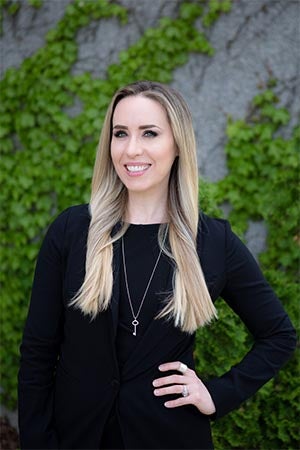Maybe it’s as subtle as not wearing pink to work, or as drastic as downplaying certain traits to in order to stay safe. Maybe it’s the difference between how “tomboys” and “sissy boys” are treated. Either way, there’s no escaping it: society still equates “feminine” with “less than”. But where do these assumptions come from? And, more importantly, how can we change them?

Tough questions about the prejudices surrounding femininity aren’t new to Rhea Ashley Hoskin. In her early teens, she wondered why she was treated differently than her “less feminine” friends. She has been studying femme theory and femmephobia for more than a decade – and hopes to challenge the norms that still cause so much harm.
In addition to being an Ontario Women’s Health Scholar, Hoskin recently received an AMTD Global Talent Postdoctoral Fellowship to continue her work here at the University of Waterloo with professors Toni Serafini (Department of Sexuality, Marriage, & Family Studies at St. Jerome’s University) and Andrea Quinlan (Department of Sociology and Legal Studies). The fellowship, funded by a generous donation from alumnus Calvin Choi (BA ’01), supports scholars looking to disrupt and innovate in their fields.
As a new member of Arts, Hoskin tells us about her postdoctoral research and why it matters now.
What is femmephobia, and how is it different from traditional sexism?
As I describe in a recent publication, three of the largest massacres in Canada over the last 40 years have been explicit misogynistic attacks: the Montreal Massacre, the Toronto van attack, and the Nova Scotia spree-killing. During the same period, serial killers Colonel Russell Williams and Bruce McArthur targeted women and the gay men of Toronto’s LGBTQ+ village, respectively.
These acts of violence are different symptoms of the same underlying social prejudice: femmephobia. Femmephobia refers to the way society devalues and regulates femininity, whether it’s femininity expressed by women, nonbinary people, or men. In fact, it can even extend to things such as labour and the environment. We have a tendency to cast things and people deemed feminine as being subordinate and as having less value – something that can be exploited.
In contrast, sexism/misogyny is about how women are devalued or regulated, whereas femmephobia is about the treatment of femininity as it applies to broader systems and experiences.
Why is it important to study femmephobia?
Femme Theory and the concept of femmephobia give us a new framework to address these persistent issues of violence by connecting all of these disparate experiences regarding femininity or feminization.
I often think about the change that would come from simply revaluing femininity – it could have ripple effects impacting a vast range of issues and people. For example, it could change how we treat the Earth, how we interact with one another, our approaches to family or relational violence, the labour we value, the people we choose for leadership roles, mask wearing behaviour, and generally encourage people of all genders to make healthier choices.
We’re already seeing this type of change happening with the #MeToo movement, where simply naming the phenomenon has led to important changes. Like rape culture, femmephobia is deeply imbedded, systemic, and taken-for-granted as a cultural norm, but we haven’t yet publicly recognized it.
Tell us about your current project. What are you investigating, and what impact do you hope the work will have?
Building on my previous research, I’ll be examining the connections between femininity, different types of prejudice, and violence. A big part of my work for the AMTD is to focus on activities that spark a conversation about femmephobia, what it is, how we can get past it, and how revaluing femininity can catalyze systemic change.
I hope this research helps us better understand how attitudes that devalue and regulate femininity can fuel other forms of prejudice. Ultimately, I think that re-valuing femininity offers a useful strategy to combat issues like misogyny, sexism, homophobia, transmisogyny, and rape culture (to name a few).
What brings you to Waterloo?
What really drew me to the AMTD fellowship was its focus on disruptive research – and providing the opportunities to mobilize it in ways that might spark the systemic change I hope to create.
I was also drawn in by Waterloo’s reputation, such as the commitment to innovation, its recognition by the United Nations as a leader in the HeForShe Campaign, and its IMPACT 10x10x10 commitment to increase women in leadership. My work with femmephobia brings together many of the issues discussed by the HeForShe campaign, which is not just for women but for everyone who has felt the burden of a gender stereotype.
I’m excited to work with Drs. Serafini and Quinlan because of their work as feminist change makers, whether through grassroots approaches such as community and campus activism, or more formal routes such as public policy and academic scholarship. They will be instrumental in creating the public dialogue I hope to achieve.